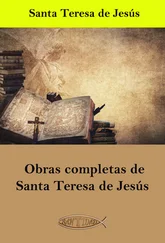10. But I have this confidence in our Lord, that He will help me here; for His Majesty knoweth that my object in writing--the first is to obey--is to inspire souls with a longing after so high a good. I will speak of nothing that I do not know by great experience: and so, when I began to describe the last kind of water, I thought it more impossible for me to speak of it at all than to speak Greek. It is a very difficult matter; so I left it, and went to Communion. Blessed be our Lord, who is merciful to the ignorant! Oh, virtue of obedience! it can do everything! God enlightened my understanding--at one time suggesting the words, at another showing me how to use them; for, as in the preceding state of prayer, so also now, His Majesty seems to utter what I can neither speak nor understand. 6
11. What I am saying is the simple truth; and therefore whatever is good herein is His teaching; what is erroneous, clearly comes out of that sea of evil--myself. If there be any--and there must be many--who, having attained to these states of prayer whereunto our Lord in His mercy has brought me--wretch that I am!--and who, thinking they have missed their way, desire to treat of these matters with me, I am sure that our Lord will help His servant to declare the truth more plainly.
12. I am now speaking of the water which cometh down from heaven to fill and saturate in its abundance the whole of this garden with water. If our Lord never ceased to pour it down whenever it was necessary, the gardener certainly would have plenty of rest; and if there were no winter, but an ever temperate season, fruits and flowers would never fail. The gardener would have his delight therein; but in this life that is impossible. We must always be careful, when one water fails, to obtain another. This water from heaven comes down very often when the gardener least expects it.
13. The truth is that, in the beginning, this almost always happens after much mental prayer. Our Lord advances step by step to lay hold of the little bird, and to lay it in the nest where it may repose. He observed it fluttering for a long time, striving with the understanding and the will, and with all its might, to seek God and to please Him; so now it is His pleasure to reward it even in this life. And what a reward!--one moment is enough to repay all the possible trials of this life.
14. The soul, while thus seeking after God, is conscious, with a joy excessive and sweet, that it is, as it were, utterly fainting away in a kind of trance: breathing, and all the bodily strength, fail it, so that it cannot even move the hands without great pain; the eyes close involuntarily, and if they are open, they are as if they saw nothing; nor is reading possible,--the very letters seem strange, and cannot be distinguished,--the letters, indeed, are visible, but, as the understanding furnishes no help, all reading is impracticable, though seriously attempted. The ear hears; but what is heard is not comprehended. The senses are of no use whatever, except to hinder the soul's fruition; and so they rather hurt it. It is useless to try to speak, because it is not possible to conceive a word; nor, if it were conceived, is there strength sufficient to utter it; for all bodily strength vanishes, and that of the soul increases, to enable it the better to have the fruition of its joy. Great and most perceptible, also, is the outward joy now felt.
15. This prayer, however long it may last, does no harm--at least, it has never done any to me; nor do I remember, however ill I might have been when our Lord had mercy upon me in this way, that I ever felt the worse for it--on the contrary, I was always better afterwards. But so great a blessing, what harm can it do? The outward effects are so plain as to leave no doubt possible that there must have been some great cause, seeing that it thus robs us of our bodily powers with so much joy, in order to leave them greater.
16. The truth is, it passes away so quickly in the beginning--at least, so it was with me--that neither by the outward signs, nor by the failure of the senses, can it be perceived when it passes so quickly away. But it is plain, from the overflowing abundance of grace, that the brightness of the sun which had shone there must have been great, seeing that it has thus made the soul to melt away. And this is to be considered; for, as it seems to me, the period of time, however long it may have been, during which the faculties of the soul were entranced, is very short; if half an hour, that would be a long time. I do not think that I have ever been so long. 7The truth of the matter is this: it is extremely difficult to know how long, because the senses are in suspense; but I think that at any time it cannot be very long before some one of the faculties recovers itself. It is the will that persists in the work; the other two faculties quickly begin to molest it. As the will is calm, it entrances them again; they are quiet for another moment, and then they recover themselves once more.
17. In this way, some hours may be, and are, passed in prayer; for when the two faculties begin to drink deep, and to perceive the taste of this divine wine, they give themselves up with great readiness, in order to be the more absorbed: they follow the will, and the three rejoice together. But this state of complete absorption, together with the utter rest of the imagination,--for I believe that even the imagination is then wholly at rest,--lasts only for a short time; though the faculties do not so completely recover themselves as not to be for some hours afterwards as if in disorder: God, from time to time, drawing them to Himself.
18. Let us now come to that which the soul feels interiorly. Let him describe it who knows it; for as it is impossible to understand it, much more is it so to describe it. When I purposed to write this, I had just communicated, and had risen from the very prayer of which I am speaking. I am thinking of what the soul was then doing. Our Lord said to me: It undoes itself utterly, My daughter, in order that it may give itself more and more to Me: it is not itself that then lives, it is I. As it cannot comprehend what it understands, it understands by not understanding. 8
19. He who has had experience of this will understand it in some measure, for it cannot be more clearly described, because what then takes place is so obscure. All I am able to say is, that the soul is represented as being close to God; and that there abides a conviction thereof so certain and strong, that it cannot possibly help believing so. All the faculties fail now, and are suspended in such a way that, as I said before, 9their operations cannot be traced. If the soul is making a meditation on any subject, the memory of it is lost at once, just as if it had never been thought of. If it reads, what is read is not remembered nor dwelt upon; neither is it otherwise with vocal prayer. Accordingly, the restless little butterfly of the memory has its wings burnt now, and it cannot fly. The will must be fully occupied in loving, but it understands not how it loves; the understanding, if it understands, does not understand how it understands--at least, it can comprehend nothing of that it understands: it does not understand, as it seems to me, because, as I said just now, this cannot be understood. I do not understand it at all myself.
20. In the beginning, it happened to me that I was ignorant of one thing--I did not know that God was in all things: 10and when He seemed to me to be so near, I thought it impossible. Not to believe that He was present, was not in my power; for it seemed to me, as it were, evident that I felt there His very presence. Some unlearned men used to say to me, that He was present only by His grace. I could not believe that, because, as I am saying, He seemed to me to be present Himself: so I was distressed. A most learned man, of the Order of the glorious Patriarch St. Dominic, delivered me from this doubt; for he told me that He was present, and how He communed with us: this was a great comfort to me.
Читать дальше












